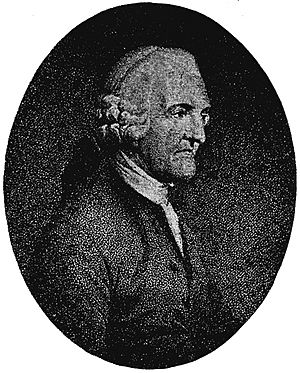Edmond Hoyle facts for kids
Quick facts for kids
Edmond Hoyle
|
|
|---|---|

|
|
| Born | 1672 England
|
| Died | 29 August 1769 (aged 96–97) London, England
|
Edmond Hoyle (born 1672, died 1769) was a famous writer. He was best known for writing books about card games. He explained the rules and how to play them. People started saying "according to Hoyle." This phrase means "exactly by the rules." It shows that Hoyle was seen as a great expert.
Contents
About Edmond Hoyle
Not much is known about Edmond Hoyle's early life. Most of what we know comes from his books. Many stories about him are not true or are made up.
Teaching Whist
By 1741, Hoyle started teaching a card game called whist to people in high society. He would sell his students handwritten notes about the game.
Hoyle made these notes into a book. He published A Short Treatise on the Game of Whist in 1742. It was quite expensive, costing one guinea.
The book sold out very quickly. Instead of printing more copies himself, Hoyle sold the rights to his book. He sold them to a bookseller named Francis Cogan for 100 guineas. This was a huge amount of money for a small book.
Pirated Copies
Before Cogan could print a second edition, two other printers copied Hoyle's book. They printed it without his permission. These copies did not say Hoyle was the author. Instead, they said "A Gentleman." The printers used fake names to hide who they were.
Cogan printed more editions of Whist. He then got a court order against the people who copied the book. To show which books were real, Cogan paid Hoyle to sign each genuine copy. Hoyle got twopence for each signature. The pirated copies were good for Hoyle because he got paid more, but they caused problems for Cogan. He had to lower the price of his books to match the fake ones.
Whist Rules Change
Hoyle's rules for whist were the main ones used until 1864. After that, new rules were made by John Loraine Baldwin. These new rules were used by important clubs like the Arlington and Portland clubs.
Other Books by Hoyle
Hoyle wrote many other books about games. Francis Cogan published some of them. These included A Short Treatise on the Game of Backgammon (1743). He also wrote An Artificial Memory for Whist (1744). This book helped players remember cards.
Hoyle also wrote short books on piquet and chess (1744). He wrote another on quadrille (1744).
In 1745, Cogan went bankrupt. He sold Hoyle's book rights to Thomas Osborne. Osborne had much more success selling Hoyle's books.
Hoyle wrote a book about the game of brag (1751). He also wrote a book on probability theory (1754). And he wrote another book on chess (1761). Over time, Hoyle's books became more popular than older game books. His work replaced The Compleat Gamester by Charles Cotton as the main guide for games.
Collected Editions
In 1748, Osborne started selling all of Hoyle's books together. The collection was called Mr. Hoyle's Treatises of Whist, Quadrille, Piquet, Chess and Back-Gammon. The whist book in this collection was called the eighth edition. The fourteenth edition (1765) was the last one published while Hoyle was alive. Later editions came out after he died.
Books Around the World
Hoyle's books were often reprinted in Ireland. This was allowed because English copyright laws did not apply there. One edition was even printed in Edinburgh. Hoyle's writings were translated into many languages. These included Portuguese (1753), German (1754), French (1761), Italian (1768), Russian (1769), and Dutch (1790).
Many new versions and reprints of his books have appeared over the years. They are often called Hoyle's Rules or Hoyle's Games.
Hoyle's Lasting Impact
Edmond Hoyle was a very important person in the world of games. He was even chosen for the Poker Hall of Fame in 1979. This is interesting because he died 60 years before the game of poker was even invented!
The saying "according to Hoyle" is still used today. It means 'correctly or properly' or 'following an expert's rules'. In British English, "a Hoyle" can mean any rule book for card games. It's like how "a Baedeker" can mean any travel guide.
Many modern books about card game rules use "Hoyle" in their titles. However, this does not mean they are directly from Edmond Hoyle's original works. It's more like how many dictionaries use "Webster" in their names, even if they are not directly related to Noah Webster's work.
See also
 In Spanish: Edmond Hoyle para niños
In Spanish: Edmond Hoyle para niños
Images for kids
 | Leon Lynch |
 | Milton P. Webster |
 | Ferdinand Smith |


